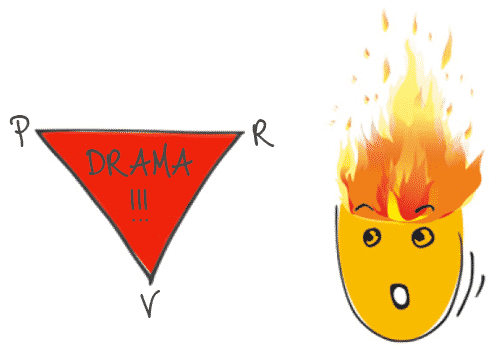Psychological Games - How to Identify Them with Transactional Analysis
If you are highly likely to conflict with someone, you can be sure that you are involved in something that Transactional Analysis calls a "game". Psychological games have nothing to do with games children play, they are also no laughing matter. On the contrary. I'll explain this more in detail later.

But first, let me give you an example:
The other day I gave a friend a text I had written to read. I wanted to have his feedback. I told him that the text was still unfinished and bad. He began to read and criticized all kinds of things. I realized how I started to get angry about it. Finally it was enough for me and I began to complain about my friend's many criticisms. He looked at me completely puzzled and did not understand what was going on. I had asked him to do exactly that - criticize my text. In the end, we were both annoyed - me due to his criticism and he because he had agreed to read the text in the first place.

ENHANCE YOUR COMMUNICATION SKILLS
FREE Compact Course

- Communicate successfully in your professional life
- Enhance conflict management skills
- Understand others better
Learn Transactional Analysis with the Compact Course. Emails, Videos, PDF-Exercises.
No Spam. Unsubscribe at any time.
1. How Psychological Games are Built
The term psychological game refers to a sequences of "hidden transactions" that have a predictable outcome. A covert transaction is a statement with an ambiguity. There is a different message in the tone than in the words. Here is a video on hidden transactions:
2. Rules of Games
- Attractive offer, disguising the trap (game invitation or laying out the bait)
- Interest in the game by from other person (acceptance of the bait/hook)
- Harmless reaction and exchange of courtesies
- Switch of roles of the inviting part
- Surprise by the invited person
- Payoff for both (negative)
Let's connect the above pattern to the example:
- I approach my friend from a certain victim persective and ask him in a childish way if he was willing to read my text. My friend gets attention from me and may even feel flattered. This could be understood as an attractive offer. At the same time, I tell him that the text is still bad. Here, I unconsciously installed the trap. I eveluate the text negatively from the outset and invite my friend to also find mistakes. I conceal from him that I would also like to have positive feedback.
- My friend went into a position of rescuing by leaving my previous rating of the text uncommented. The game started.
- He read the text and criticized a lot. He felt good about this and I got the feedback I had asked for. We have an intense exchange of attention - which is a basic psychological need of people.
- After some time it became too much criticism. I got more and more annoyed. Until it was enough for me. I switched from the role of the grateful victim to the role of the persecutor and started to be annoyed with my friend.
- He was visibly surprised by my switched mood.
- The payoff was that both parties felt bad. The relationship had been damaged.

Typical change of roles in the end of a game. I switched from a victim to a persecutor position, my friend from rescuer to victim position.
If you want to know more about changing roles, look at my article on the drama triangle.
It's often not easy to realize that you are in the middle of playing a game. With this type of games you may also unconsciously advance your life script Transactional Analysis. In order to leave a game or not even enter into a game, knowing about these kinds of games is essential. It also helps to reflect one's own behavior. When I started dealing with psychological games I was only able to see that I had already played games before. Thus, I had often already experienced a negative payoff. Over time, I recognized the pattern earlier and could then interrupt it - interstingly, you can exit at any point in the game.
ENHANCE YOUR COMMUNICATION SKILLS
FREE Compact Course

- Communicate successfully in your professional life
- Enhance conflict management skills
- Understand others better
Learn Transactional Analysis with the Compact Course. Emails, Videos, PDF-Exercises.
No Spam. Unsubscribe at any time.
3. How you Can Avoid Psychological Games
Transactional Analysis theory already gives a lot of examples of possible. Eric Berne provides a good overview in his book: "Games People Play". Incidentally, Eric Berne is the founder of Transactional Analysis.
A classic included in the book is the "yes, but" game: A help seeker asks someone for advice on a problem. The other person appreciates the attention and gives one well-intentioned advice after another, but after each advice a "Yes, but..." from the help seeking person follows with a seemingly fitting counter-argument: The exchange goes well until the counselor has no more ideas. Now both feel bad, the person seeking help because they did not get any help and the counselor because they couldn't help.

But Transactional Analysis also offers ways out of games. Here are a few options:
- Ignore a game invitation
- Ask for the real need - "What is it you want from me now?"
- Know your weak spot when it comes to games (are you perhaps prone to be a rescuer, or are you more likely to be a victim or persecutor?) If you are often the rescuer, then you can respond more consciously to invitations to help and hold yourself back.
- You yourself can do what you ACTUALLY want. You could ask yourself, "What do I want right now?"
- A Transactional Analyst once said to me, "The best way to interrupt games is to pursue your own goals."
The example of my friend and I was a bit different in reality. I realized how annoyed I was, interrupted the communication and analyzed the situation. I asked myself what exactly I wanted from my friend. I noticed that in addition to the criticism, I had also hoped for praise for my good ideas. I told my friend and he promptly gave it to me. I could now understand his criticism much better, because he had told me what he liked as well. My anger was gone and we avoided a game payout in the form of negative emotions. Thank you Transactional Analysis!
Transactional Analysis knows even more game exits. In the basic course Transactional Analysis, we will take a closer look at psychological games.

